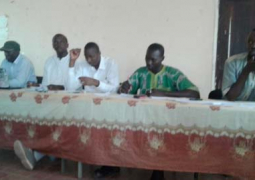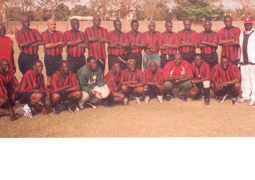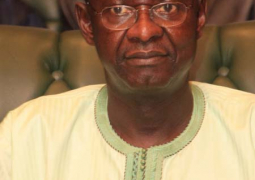The Independent Electoral Commission, the body mandated to conduct elections and election-related issues, embarked on a supplementary registration countrywide from 14 January to 12 March 2016.
Alhaji Mustapha L. Carayol, the commission chairman, said his institution is responsible for all elections in the country and the purpose of the gathering was to update the general public through the media on status of the on-going supplementary voter registration.
“It is fitting to give you an update on the on-going supplementary registration of voters,” he said.
According to IEC chairman, this was necessitated by the fact that after five years when the last general registration of voters was conducted, many Gambians have turned 18 years and/or will be 18 years by the date of the next election, which will be held on 1 December 2016.
Hesaid section 12 (b) of the Elections Act entitles a citizen to have his/her name entered on a register of voters in a constituency if he/she has attained or will on the date of holding the next election attain the age of 18 years.
“It is legal and apt to enfranchise these Gambians to participate in the electoral process,” he added.
He said: “At the launching of the 2016 to 2018 electoral calendar, I did outline the array of electoral activities for this period as follows: Presidential Election on 1 December 2016, National Assembly Election on 6 April 2017 and Local Government Elections 12 April 2018.”
Mr Carayol further stated that IEC is on the course with this electoral calendar, as the supplementary registration of voters started as scheduled, and it is progressing successfully.
The commission had not yet encountered any major issue in the conduct of this national electoral activity, he told journalists.
The commission had recruited 170 registration staff, trained and deployed in the field, and out of these 20 are senior registration officers, 50 supervisors and 100 registering clerks.
He further told journalists that there are 50 teams made up of one supervisor, one registering clerk and one operator.
He said registration of voters is free of charge; eligible applicants only present themselves in person to the registration teams at the registration centres with anyone of the required documents and get registered.
These documents are a Gambian Birth Certificate, a Gambian National Identity Card, a Gambian Passport or a document certified by the district Seyfo or an Alkalo of the village of the birth of the applicant stating that the applicant was born in the district or village.
He also said attestation forms have been printed for this purpose and are being issued free of charge by the registration teams to applicants.
“The registration teams are to cover 636 registration centres countrywide and have done almost half of the number of registration centres in the four weeks that they worked so far,” he said.
IEC Chairman Carrayol further revealed that the provisional number of voters registered at the end of the fourth week is as follows: Banjul 649 voters, Kanifing 5001 voters, Brikama 13039 voters, Kerewan 6245 voters, Mansakonko 2732 voters, Janjanbureh 9639 voters and Basse 7242 voters.
The total provisional number of registered voters at the end of the fourth week is 44, 547 voters; replacement of lost, damaged, mutilated or brunt voter’s cards is also taking place at the registration centres, he said.
He said the replacement of voting cards could be done at any registration centre and a voter who replaces his/her voting card could only vote during elections at the polling centres he/she originally registered.
He said there is a fee of D100 charged for replacing a voting card to minimise the rate at which people lose or damage their voting cards.
He reminded all Gambians that the sole purpose of the voter’s card is for voting at elections and not for any other use and, therefore, appealed to all institutions and organisations to disallow the use of voters cards in their transactions.
The provisional number of replacements at the end of the fourth week is as follow: Banjul 238 voters’ cards, Kanifing 1268 voter cards, Brikama 1795 voters’ cards, Kerewan 828 voters’ cards, Mansakonko 307 voters’ cards, Janjanbureh 503 voters’ cards and Basse 307 voters’ cards, totalling it to 5,246 voters’ cards.
“It is illegal to attempt to register more than once, and for those who registered in 2011 must not register again, because there is penalty on double registration with a fine of D25,000 or a prison term of 2 years with being barred from participating in any future electoral activities for not more than 10 years, if convicted.”
Read Other Articles In Article (Archive)

EMPRETEC Family Forum discusses achievements and challenges of SMEs
Jun 29, 2016, 1:31 PM



